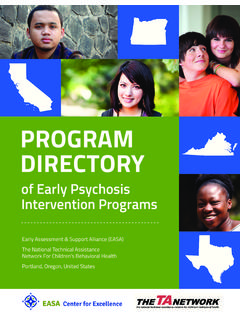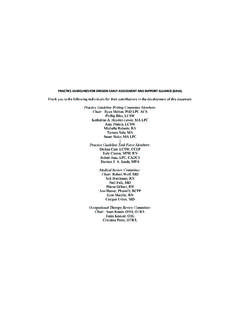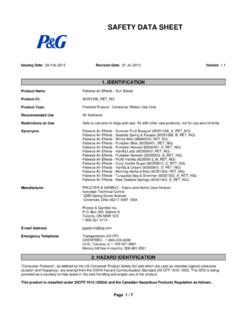Transcription of Adherence rating scales - EASA
1 An international educational activity developed by J Kane (USA), W Kissling (Germany). T Lambert (Australia) and E Parellada (Spain). Adherence rating scales This document describes some features of the more widely used of the currently available Adherence rating scales . The objective of some of the earlier tools was primarily to allow the patient's subjective experience of treatment with antipsychotic drugs to be quantified (Barbe a et al, 2006). Later works focused more on the impact of pharmacological therapy on quality of life, and the relationship between this ( the patient's subjective experience) and their attitudes and Adherence to medication. Among the various tools developed over the past 40 years are the following: Neuroleptic Dysphoria scale ; NDS (Van Putten and May, 1978). Dysphoric Response Index; DRI (Singh and Kay, 1979). Drug Attitude Inventory; DAI (Hogan et al 1983; Awad, 1993). Medication Adherence Questionnaire; MAQ (Morisky et al, 1986).
2 rating of Medication Influences; ROMI (Weiden et al, 1994). Subjective Well-Being under Neuroleptic Treatment self-applied scale ; SWN (Naber et al, 1995; 2001). Clinician rating scale ; CRS (Kemp et al, 1996, 1998). Medication Adherence rating scale ; MARS (Thompson et al, 2000). Attitudes towards Neuroleptic Treatment; ANT (Kampman et al, 2000). Personal Evaluations of Transitions in Treatment; PETiT (Voruganti and Awad, 2002). Brief Evaluation of Medication Influences; BEMIB (Dolder et al, 2004). Brief Adherence rating scale ; BARS (Byerly et al 2008). Of the currently available tools, the following are considered among the most useful /. appropriate for the specific purpose of assessing the patient's Adherence to prescribed medication, and are described in more detail below. Drug Attitude Inventory (DAI) p2. Personal Evaluations of Transitions in Treatment (PETiT) p5. Medication Adherence rating scale (MARS) p7.
3 Clinician rating scale (CRS) p8. Brief Adherence rating scale (BARS) p9. CERP Adherence rating scales 1. Drug Attitude Inventory; DAI (Hogan et al, 1983). The DAI consists of a questionnaire that is completed by the patient. It includes a series of questions, each with true/false answers, pertaining to various aspects of the patient's perceptions and experiences of treatment. The original scale consists of 30 questions, but a short form consisting of 10 questions has also been validated (page 4; Awad, 1993). The patient should be asked to read each statement in the questionnaire (see page 3). and decide whether they believe it to be true or false (or mostly true/false) as applied to their own experience with medications (only those medications used for the patient's mental health needs). They should circle their answers in ink on the form. Scoring The DAI-30 (page 3) contains 15 items that a patient who is fully adherent to their prescribed medication (and so would be expected to have a positive' subjective response to medication) would answer as True', and 15 items such a patient would answer as False'.
4 To calculate the score from a set of answers, each positive' answer is given a score of plus one, and each negative' answer is given a score of minus one. In the following table, the positive' answers (score = plus one) are shown in bold text. In question one, for example, an answer of False' would score plus one and an answer of True' would score minus one. The total score for each patient is calculated as the sum of the positive scores, minus the negative scores. A positive total score indicates a positive subjective response (adherent). and a negative total score indicates a negative subjective response (non-adherent). 2. CERP Adherence rating scales DAI-30 questionnaire Name Date Question Answer*. 1 I don't need to take medication once I feel better T/F. 2 For me, the good things about medication outweigh the bad T/F. 3 I feel strange, "doped up", on medication T/F. 4 Even when I am not in hospital I need medication regularly T/F.
5 5 If I take medication, it's only because of pressure from other people T/F. 6 I am more aware of what I am doing, of what is going on around me, when I am on medication T/F. 7 Taking medications will do me no harm T/F. 8 I take medications of my own free choice T/F. 9 Medications make me feel more relaxed T/F. 10 I am no different on or off medication T/F. 11 The unpleasant effects of medication are always present T/F. 12 Medication makes me feel tired and sluggish T/F. 13 I take medication only when I feel ill T/F. 14 Medications are slow-acting poisons T/F. 15 I get along better with people when I am on medication T/F. 16 I can't concentrate on anything when I am taking medication T/F. 17 I know better than the doctors when to stop taking medication T/F. 18 I feel more normal on medication T/F. 19 I would rather be ill than taking medication T/F. 20 It is unnatural for my mind and body to be controlled by medications T/F.
6 21 My thoughts are clearer on medication T/F. 22 I should keep taking medication even if I feel well T/F. 23 Taking medication will prevent me from having a breakdown T/F. 24 It is up to the doctor to decide when I should stop taking medication T/F. 25 Things that I could do easily are much more difficult when I am on medication T/F. 26 I am happier and feel better when I am taking medications T/F. 27 I am given medication to control behaviour that other people (not myself) don't like T/F. 28 I can't relax on medication T/F. 29 I am in better control of myself when taking medication T/F. 30 By staying on medications I can prevent myself getting sick T/F. If you have any further comments about medication or this questionnaire, please write them below T = True, F = False *Answers shown in bold are scored +1; answers in normal font are scored -1. 3. CERP Adherence rating scales The DAI-10 was derived by means of stepwise discriminant analyses applied to the responses of 150 schizophrenia patients to the DAI-30 (Awad, 1993).
7 The DAI-10 contains six items that a patient who is fully adherent to prescribed medication would answer as True', and four they would rate as False'. Scores are allocated to each answer and the total score is calculated in the same way as for the DAI-30. Similarly, a positive total score indicates a positive subjective response (adherent) and a negative total score indicates a negative subjective response (non- adherent). DAI-10 questionnaire Name Date Answer Question (True/False)*. 1 For me, the good things about medication outweigh the bad T/F. 2 I feel strange, "doped up", on medication T/F. 3 I take medications of my own free choice T/F. 4 Medications make me feel more relaxed T/F. 5 Medication makes me feel tired and sluggish T/F. 6 I take medication only when I feel ill T/F. 7 I feel more normal on medication T/F. 8 It is unnatural for my mind and body to be controlled by medications T/F. 9 My thoughts are clearer on medication T/F.
8 10 Taking medication will prevent me from having a breakdown T/F. If you have any further comments about medication or this questionnaire, please write them below T = True, F = False *Answers shown in bold are scored +1; answers in normal font are scored -1. 4. CERP Adherence rating scales 2. Personal Evaluations of Transitions in Treatment; PETiT (Voruganti and Awad, 2002). PETiT is another self-administered patient questionnaire. It was developed with the aim of producing a tool that could monitor changes perceived by a patient receiving therapy based on antipsychotic drugs, and particularly to measure the effects of atypical antipsychotic drugs on outcomes such as subjective well-being. The patient should be advised that the questions are about how they have been feeling and doing during the past week. They should read each of the statements in the questionnaire (page 6) and should choose the answer that best indicates their feelings, by circling it with a pen.
9 They should use the following key: Often Frequently feel or act in the way described Sometimes Only feel or act that way occasionally Never Had not felt or acted that way during the past week At the time of publication (2002), the authors advised that further information on the method of administration, scoring and interpretation of data was available (free of charge) by contacting them directly: 5. CERP Adherence rating scales PETiT questionnaire General questions Question Often Sometimes Never 1 My mind is sharp and clear 2 I am worried about what is happening to my health 3 I feel dull and sluggish 4 I believe that people feel comfortable around me 5 I feel too tired to do things that I should do 6 I find it hard to come up with new ideas 7 I am unable to trust people 8 I am satisfied with my life 9 I am able to concentrate on reading or television 10 I am unhappy 11 I have family or friends who really understand me 12 My sex drive is weak 13 I am able to communicate better with people Chores such as cleaning, washing and shopping are 14.
10 Too much for me 15 I am able to remember things easily 16 I feel ready to work either as a volunteer or for pay 17 I feel good about myself 18 My future seems gloomy 19 I avoid meeting new people 20 I feel weird and strange 21 I can handle the daily hassles of life 22 I dislike the way I look 23 I am not sleeping well 24 I am able to do things as well as other people Questions about medication Question Often Sometimes Never 1 I forget to take my medication 2 My medication is helping me 3 I dislike my current medication Friends and family believe that my current medication 4. is good for me 5 Taking medication is unpleasant I feel that the good things about taking medication 6. outweigh the bad 6. CERP Adherence rating scales 3. Medication Adherence rating scale ; MARS (Thompson et al, 2000). Thompson et al (2000) identified several deficiencies in the DAI as a measure of Adherence and proposed a new inventory, the MARS scale , that incorporates features of both the DAI and the MAQ (Morisky et al, 1986) but which they claimed to have greater validity and clinical utility.






